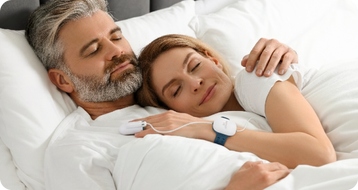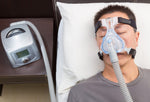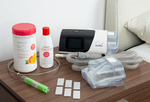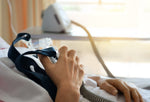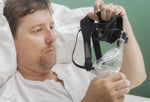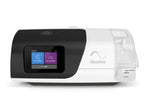On This Page
How to Buy a CPAP Machine
Our editorial process includes extensive measures to verify accuracy, provide clarity on complex topics, and present factual information. Read more
Key Takeaways
- A diagnosis of obstructive sleep apnea and a prescription from a physician are required before purchasing a CPAP machine.
- Many private insurance plans and Medicare cover CPAP machines, often after a trial period of use and documented compliance.
- There are several places to buy CPAP equipment—online retailers like Sleep Doctor, DME suppliers, and sleep clinics—with online options often offering the best selection and pricing.
What to Know Before You Buy
Before you can purchase a CPAP machine, you must receive a sleep apnea diagnosis, get a CPAP prescription, and identify your insurance coverage.
Receive a Diagnosis
CPAP is specifically designed for sleep-related breathing disorders like obstructive sleep apnea (OSA), so it’s important to see a doctor and rule out other causes of your symptoms. Your doctor will ask about your symptoms and history.
Common symptoms of OSA include:
- Snoring
- Choking, gasping, or snorting during sleep
- Morning headaches
- Feeling sleepy during the day
- Fatigue or tiredness
An OSA diagnosis requires either an overnight sleep study in a sleep clinic, or a home sleep apnea test. In either case, you’ll be monitored with a variety of sensors while asleep, and a doctor will review the results to determine if you have obstructive sleep apnea.
Sleep Doctor offers an FDA-approved home sleep test that can be taken in the comfort of your own bed, with results reviewed by a board-certified sleep physician. You'll then set up a telehealth appointment with a respiratory therapist to review your results and receive a diagnosis and treatment plan.
Get a Prescription
After diagnosis, your doctor or sleep specialist may provide a prescription for a CPAP device. If you go through Sleep Doctor, you prescription is included with your results, which your respiratory therapist will go over with you.
Discuss with your healthcare provide any specific recommendations for the type of machine best suited to your needs. Your doctor can also recommend alternative treatment options.
Determine Your Insurance Coverage
Many private insurance and Medicare policies cover CPAP. Review your policy details or call your provider to learn about your CPAP coverage. This helps understand exactly how much you'll have to pay as you enter the buying process.
If you're not sure where to start, CPAPinsurance.com is a helpful resource for understanding your options and getting the treatment you need with as little inconvenience and out-of-pocket costs as possible.
Most CPAP suppliers that take insurance for CPAP machines. There are also out-of-pocket options for purchasing a CPAP machine without insurance. Both private insurers and Medicare generally initially cover a CPAP machine for a three-month trial period to ensure you're using the CPAP machine regularly and benefiting from it. They check this by monitoring your usage and seeing if your symptoms, including the number of lapses in breathing you have each hour (your apnea-hypopnea index), are reduced.
After the trial period and a follow-up visit to determine if CPAP therapy is working for you, coverage continues. Adjustments may be made to the machine settings during this time.
Where to Buy a CPAP Machine
You can buy CPAP machines from a variety of sources, including DME providers, online retailers, and sleep labs and clinics. Each type of supplier has its pros and cons. While buying from your sleep lab allows you to work directly with your healthcare team, you may find better prices online.
Traditional CPAP machines that operate at a single pressure level can cost anywhere from $500 to $1,000, but other types of machines with more advanced features may cost up to $3,000.
Sleep Doctor
Sleep Doctor offers a wide selection of CPAP, APAP, and BiPAP machines from trusted brands, along with bundle deals that include masks, filters, and accessories. You can order online, have your device shipped directly to your door, and access ongoing support for setup, troubleshooting, and therapy success.
Other Online Retailers
Other online retailers also sell CPAP machines and accessories, with many accepting insurance or Medicare coverage. Some of these providers offer additional services such as at-home sleep apnea tests, virtual consultations, and personalized sleep coaching to help guide you through diagnosis and treatment.
DME Provider
Both local and national durable medical equipment (DME) providers sell CPAP machines and accessories in addition to other medical equipment. Your sleep specialist or insurance provider may recommend a medical supply store they work with, or you may search online to find a DME provider. DME providers may sell CPAP machines online, in brick-and-mortar stores, or both.
Sleep Labs and Clinics
Many sleep labs and clinics sell CPAP machines and accessories directly to their clients. If you undergo an in-lab sleep study and get diagnosed with obstructive sleep apnea, your sleep specialist or technician can let you know if their establishment sells CPAP-related items.
Types of CPAP Machines
CPAP therapy is often the first treatment option offered for obstructive sleep apnea. In some cases, however, other types of PAP therapy might be recommended. All types of sleep apnea machines deliver pressurized air through a tube and mask to keep the airway open. Learn about the different types of positive air pressure (PAP) therapy out there, as well as when they are recommended.
CPAP
CPAP machines delivers air at a fixed rate of pressure, keeping the airway open during sleep. This is the gold standard obstructive sleep apnea treatment. Some CPAP machines have features that allow air pressure to gradually ramp up when a person first goes to sleep or to be slightly reduced when a sleeper first exhales, both of which can make the experience more comfortable.
APAP
Instead of releasing air at a fixed rate of pressure, auto-adjusting positive airway pressure (APAP) machines vary the pressure of air released as a person sleeps. Sensors identify when breathing slows down, and air pressure increases in response.
Sleepers may find APAP more comfortable than fixed CPAP because air pressure levels match their needs throughout the night. APAP devices are often prescribed when a person struggles with the air pressure from a standard CPAP machine. Like some CPAP machines, APAP may also have ramp-up and pressure relief features.
BiPAP
Bilevel positive airway pressure (BiPAP or BPAP) machines deliver air at two pressures — one while a sleeper is breathing in, and one while they are breathing out. BiPAP machines typically cost significantly more than traditional fixed CPAP machines. They are also commonly prescribed when a person has a more complex condition, like central sleep apnea, or multiple disorders.
Travel CPAP
Travel CPAP machines operate the same way CPAP machines do, but they are designed specifically for travel. These devices are usually smaller than traditional CPAP machines, making them easier to pack and carry. They also often have a battery-operated option, along with a rechargeable battery, so sleepers can use them without sleeping near an electrical outlet.
Tips for Buying CPAP Accessories
In addition to the machine itself, you’ll need to purchase CPAP accessories to begin therapy.
- CPAP Mask: There are many types of CPAP masks, and it’s common to try several options before choosing the most comfortable fit for you. The most common masks cover your nose or both your nose and mouth. A chin strap may also be helpful to help you breathe through your nose if you are using a nasal mask. Like CPAP machines, CPAP masks also require a prescription.
- Tubing: Your machine will come with a flexible hose connecting the CPAP machine to your mask, supplying airflow while you sleep. The tubing may be heated or unheated. Heated tubing can help reduce water buildup for systems with a built-in humidifier.
- Filters: A filter cleans the air released by the CPAP machine before it enters your body. Some CPAP machines require disposable filters, while others use reusable ones. Either way, you will need to purchase replacement filters as often as recommended by your machine’s manufacturer.
You can buy these supplies at many of the same retailers and clinics that sell CPAP machines. Remember that CPAP therapy takes time to get used to, so don’t get discouraged if you’re having trouble sleeping at first. If CPAP isn’t working for you, speak to your doctor to see if there are modifications that can be made to the machine or accessories to better suit your needs.
Frequently Asked Questions
Can I buy a CPAP machine without a sleep study?
A person can only buy a CPAP machine if they've been diagnosed with sleep apnea and given a prescription. Many people are able to skip the overnight sleep study in a sleep lab and instead receive an obstructive sleep apnea diagnosis through a home sleep test (HST).
Your doctor or sleep specialist can help you determine if you can be tested for sleep apnea through an HST rather than an in-lab sleep study. If an HST determines that you have sleep apnea, then you will receive an official diagnosis and be eligible for a CPAP prescription, which will allow you to buy a machine.


